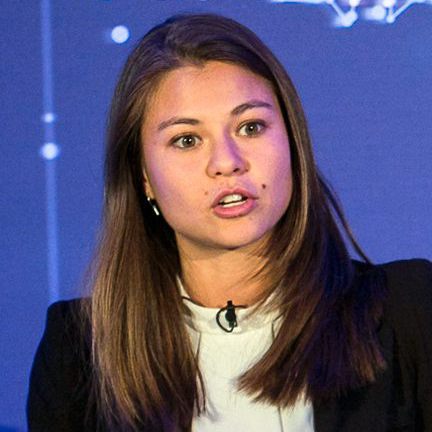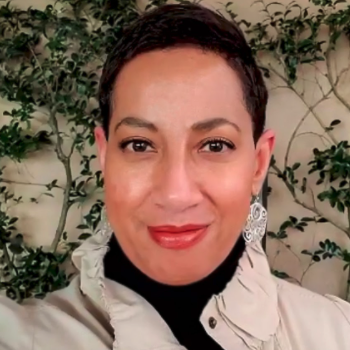< Back to all episodes
Luther Hughes and Lydia Boss
Luther Hughes and Lydia Boss: Antiracism, Community-building, and Grants for Artists
This episode of Impact Audio features Luther Hughes and Lydia Boss, Program Managers at Artist Trust, discussing their work to improve equity in grantmaking and the arts by embracing trust, putting relationships first, and fostering community.

Luther Hughes and Lydia Boss: Antiracism, Community-building, and Grants for Artists
Join Submittable and special guests Luther Hughes and Lydia Boss in a discussion about strategies for improving equity in the grantmaking process.
Description:
It’s one thing for funders to include equity in a mission statement and another entirely for organizations to take real, antiracist action. The third episode of Impact Audio is focused on values and techniques that can help grantmakers put good intentions into practice, with Luther Hughes and Lydia Boss, Program Managers at Artist Trust. Founded in 1986, Artist Trust is a not-for-profit organization dedicated to supporting Washington artists working in all creative disciplines.
In this episode, you’ll learn:
How to prioritize relationships for equity
Tips for orienting a review panel on your mission
The value of trust and qualitative outcome-assessment
Why taking a stand matters
Drawn from a longer conversation on strategies for enhancing equitable practices in grantmaking, these excerpts feature key takeaways to help you get started. We hope they serve you well.
Guests:

Luther Hughes
Born and raised Seattle, Luther Hughes is the author of *A Shiver in the Leaves* (BOA Editions, 2022) and the chapbook *Touched* (Sibling Rivalry Press, 2018). He is the founder of Shade Literary Arts, a literary arts organization for queer writers of color, and co-hosts The Poet Salon podcast. His work has been published in *Poetry, The Seattle Times, Paris Review, The Rumpus,* and others. He is the recipient of the 2020 Ruth Lilly and Dorothy Sargent Rosenberg Fellowship and the 2020 92Y Discovery Poetry Prize. Luther received his MFA from Washington University in St. Louis.

Lydia Boss
Lydia Boss is a Seattle-based artist with a diverse professional background rooted in teaching, curating, and creative programming. Her studio practice includes glass, photography, collage, and new media. Lydia has exhibited her work internationally and was recently named the recipient of the 2019 John and Mary Shirley Scholarship award from Pratt Fine Arts Center. Currently working as a Program Manager at Artist Trust, reach out to Lydia about grants, professional development, and program partnerships.
Transcript:
Episode Notes
Learn more:
Stream the full webinar featuring Luther Hughes and Lydia Boss: Exploring Ways to be Antiracist: Strategies for Grantmakers.
Read a comprehensive blog on How to Center Equity in Your Grantmaking, featuring Luther and Lydia.
Discover Artist Trust. Founded in 1986, Artist Trust is working toward becoming an antiracist organization and collaborating with artists of color to better support artists across Washington State through grants, resources, events, and professional development.
Interested in more quality content for grantmakers focused on diversity, equity, and inclusion (DEI)? Here are a few Submittable resources:
Redistributing Power in Philanthropy: A Conversation with Shaady Salehi (Webinar)
The Review (Bi-monthly newsletter by Sam Caplan)
Full Transcript
Welcome to Impact Audio. I’m Rachel Mindell.
Today’s episode is about antiracism in grantmaking.
You’ll hear from Luther Hughes and Lydia Boss, guests on a recent Submittable webinar and program managers at Artist Trust. Artist Trust is a not-for-profit organization dedicated to supporting Washington artists working in all creative disciplines.
Born and raised in Seattle, Luther Hughes is the author of A Shiver in the Leaves (BOA Editions, 2022) and the chapbook Touched (Sibling Rivalry Press, 2018). He is the founder of Shade Literary Arts, an organization for queer writers of color, and he co-hosts The Poet Salon podcast.
Lydia Boss is a Seattle-based artist with a diverse professional background rooted in teaching, curating, and creative programming. Her studio practice includes glass, photography, collage, and new media. Lydia has exhibited her work internationally.
We spoke with Luther and Lydia about their efforts at Artist Trust to improve equity in the grantmaking process, especially through conversations with community and an emphasis on trust. Lydia and Luther both share their thoughts.
***
Lydia
We really recognize that the future success of artists does need to be about centering artists as experts. And that means not just in their art, but also in design, in communications, in creative strategy, in community building. Artists are full of multitudes and full of experience that has a lot of value. And so it's our responsibility, we feel, as an organization to use our resources, money and otherwise, to support and empower artists in our community. And our team is really trying to focus on that work, not just in programs, but also in other areas of our work as a team.
Luther
And also just, you know, trying to build relationships and prioritizing relationships over other things, because at the end of the day, again, we're serving artists and serving our community. And so we spent a lot of time now for sure, talking to artists, asking them for advice, asking them what they need from Artist Trust and from our serving orgs at large. You know, we do a lot of programs, or are planning our programs, where it's about just holding space for artists to come and talk and network and build community. And again, it’s just talking with them and letting them know, like, hey, you know, I'm here to help you. What can I do for you? And also that we're also human beings, too, right? And so we're doing the work with them. But again, it's about building relationships with them and asking them, you know, those things like, how can we better serve you as an artist? What else can we do to help you? And taking their feedback as strong feedback and strong advice, because, again, they are the experts in what they need from us. And so talking to them and asking those questions really allows us to kind of see more holistically what we need to do for our community.
***
To further improve relationships and facilitate equity, the team at Artist Trust believes in streamlining the application process, to make it less time-consuming and more accessible for grant seekers. Whenever possible, they allow for video and audio artist statements—and letters of recommendation are optional. They have also broadened disciplinary categories to include art forms that have been historically excluded, such as folk storytelling and traditional arts.
Alongside a focus on the grant applicant experience, the team at Artist Trust understands the importance of open lines of communication with review panelists.
***
Luther
We… invite panelists to give us feedback at the end of the process to let us know how we can do better and be more supportive of them and also of artists. And also we have this new thing that was suggested actually, I think, by somebody else called an orientation. An orientation was just meeting with the panelists beforehand to kind of go over a lot of the background of the award, to go over the panel process, to go over what their roles and duties are as panelists, and also go over policies like conflict of interest policies. But really also to talk about what it means to look at these applications through the lens of racial equity and to have geographic diversity. I'm talking about the biases that we all come to the table with. We're talking about institutional barriers that we all come with and we inherit. Talking a lot about the difference between, say, a King County artist who has a lot of resources versus a rural artist on the East side who doesn't have the same resources. And talking about what that means to review applications with both of those things in mind, and understanding that, say a Latinx artist in, I don't know, Franklin County might not have the same opportunities as a Latinx artist in King County. And what does it mean to be geographically diverse? And also, again, thinking about racial equity when looking at the applications and really tearing down those expectations, tearing down walls and barriers and allowing them to also ask these questions of us and being honest. Be like, hey, you know, this will happen. And if it does happen, we'll address it in this thing. And if it doesn't, that's fine. But also, again, talking about racial equity, anti-racism and how it relates to their roles as panelists is a big thing we also talk about in our orientation.
We also explicitly tell our panelists don't judge applications based off of writing or grammar because, you know, it's—writing is a skill and not everybody has that skill to be a professional or a fantastic writer. And also everybody might not use English as their first language. So understanding that cool, hey, like this person may not have great English skills. Don't judge people off of their grammar. Judge them off of what's happening in the content of the work samples. And so that's also the way we're trying to tell panelists, kind of like, you know, let's scale it back. Let's talk about that.
***
Artist Trust also seeks to strike a balance in terms of grant reporting. They have sought to move away from the traditional quantitative reports which could be a barrier for some, while still measuring impact. The key has been listening to and trusting the community they serve.
***
Lydia
We are moving away from project-based grants, and that means that we don't have expectations once someone has received funding from us. We don't expect a report from them; they don't owe us anything. Artists don't need to be told what to do with the money that we give them, right? Artists know how to use that money to support their life and their work. And so we really want to remove this idea of having strings attached to the funding that we are able to share out, because for an artist if travel or research is best for you, that's great. If supporting a family member with that money is what you need to do, you don't owe us an explanation. And honestly, we're honored to be a part of that, if that's what you'd like to do with the funding.
***
Shifting to an approach focused on qualitative impact has helped the team at Artist Trust stay focused on their mission.
***
Lydia
I think that it is important to us to know that our funding does have an impact on the artists that we're working with, but we're interested in exploring other means of continuing to support artists in this work. Something that we've talked about a lot regarding other funders is the idea that the support stops at funding. And we're really interested as an org in the more relational aspects of connecting with folks after they've been supported with our funding and ensuring that they feel connected to the organization to share back their work with us. And then in turn, we can help to amplify that work.
Luther
And also understanding. I do think, I believe that for sure, numbers play a big part in how we're talking about things and how we're doing the work, quote unquote, but also understanding that experience is also as qualitative as numbers and numerical impact. And so understanding that even though we're not asking them to report what they're doing, but we're just asking them how they're doing, what is going on with them, how their art making is going. That's also important as we've got x amount of numbers doing x amount of things right. Because, again, it goes on to racial equity work. A lot of BIPOC artists and people in general, their experiences aren't seen as qualitative as everybody else. And so if we're asking you to do this work and give you money to do what you want to do, do it. We believe you. We trust you. When we say to you, how's it going? And you’re saying, it's going great. I did this, this, and that. Cool. Take it to the board. Hey, so-and-so did this work because of the funding that you allowed them to get? Isn’t that amazing? And then it's up to them to be like, that is amazing. Oh my gosh, keep talking to artists because numbers is also a barrier. Right? And so how are you removing those? Removing that report is removing that barrier and allowing for relationships to foster and grow and have to be more important than just reporting and numbers.
***
Inherently, doing antiracist work can mean taking some risks as an organization. Lydia talks about how to frame these sometimes difficult conversations as an opportunity for growth and evolution.
***
Lydia
Doing your work through a racial equity lens is the right thing to do, and I don't think any of us should be afraid of trying to do the right thing and trying to move through this work authentically. I'm just going to go out on a limb here and say that if we have a donor that we lose because they're not interested in our anti-racist work, then we're not the right org for them. And I personally feel at peace with that, and I think our broader team would say the same thing. I think hopefully it's more of an educational moment and we can say this is the work that we're doing and we want you to be a part of it. We don't want to lose you, but also we're not going to let go of this priority for our community and for our team. If it ends up not being the right fit, then that's OK, and it's an unfortunate thing, but when it comes to fear and leadership, I think that folks should be more afraid of not trying.
***
Luther suggests framing the narrative so that everyone feels a call to action when it comes to anti-racist work.
***
Luther
So this is to say, again, it's not easy. It's difficult. It's very hard, exhausting work. But at the end of the day, anti-racist work benefits everybody. No matter who you are, no matter where you're from or your background, it benefits you in some way. And I think positioning that narrative that way would allow for some kind of understanding. And also going back to who you're serving. Going back to your audience. If your audience, if who we’re serving wants that from us, why not do it? What is the harm in just trying it to become a better place for who you're serving? I think, again, positioning that narrative in that way, that this work is not just for BIPOC people, it's for everybody. Because at the end of the day, we're all in community together, no matter our race, no matter our gender or no matter our ABC and D, right? It’s for everybody because we're living together amongst each other.
***
If you enjoyed these excerpts and want to hear more, including specific examples of how Artist Trust promotes equity and manages grants using Submittable, please check out the full video conversation between Luther and Lydia, linked in the episode notes. For other great resources on Diversity, Equity, and Inclusion, including blogs, events, and guides, visit submittable.com/resources.
Thank you for joining us. Impact Audio is edited and produced by Jordan Marvin and our crew at Submittable. Submittable is a cloud-based social impact platform designed to help your team make better decisions and have a bigger impact. We’d love to partner with you to maximize social good and create lasting change through smarter technology—find out more at Submittable.com. And until next time, take good care.
Additional Resources
Season 1 , Episode 2| 14 Min
Louise Bleach and Mark Horoszowski: CSR, Social Enterprise, and Doing Well by Doing Good

Louise Bleach

Mark Horoszowski
Season 1 , Episode 1| 56 Min
Satonya Fair and Sam Caplan: Philanthropy, Impact, and the Future of Grantmaking

Sam Caplan

Satonya Fair









